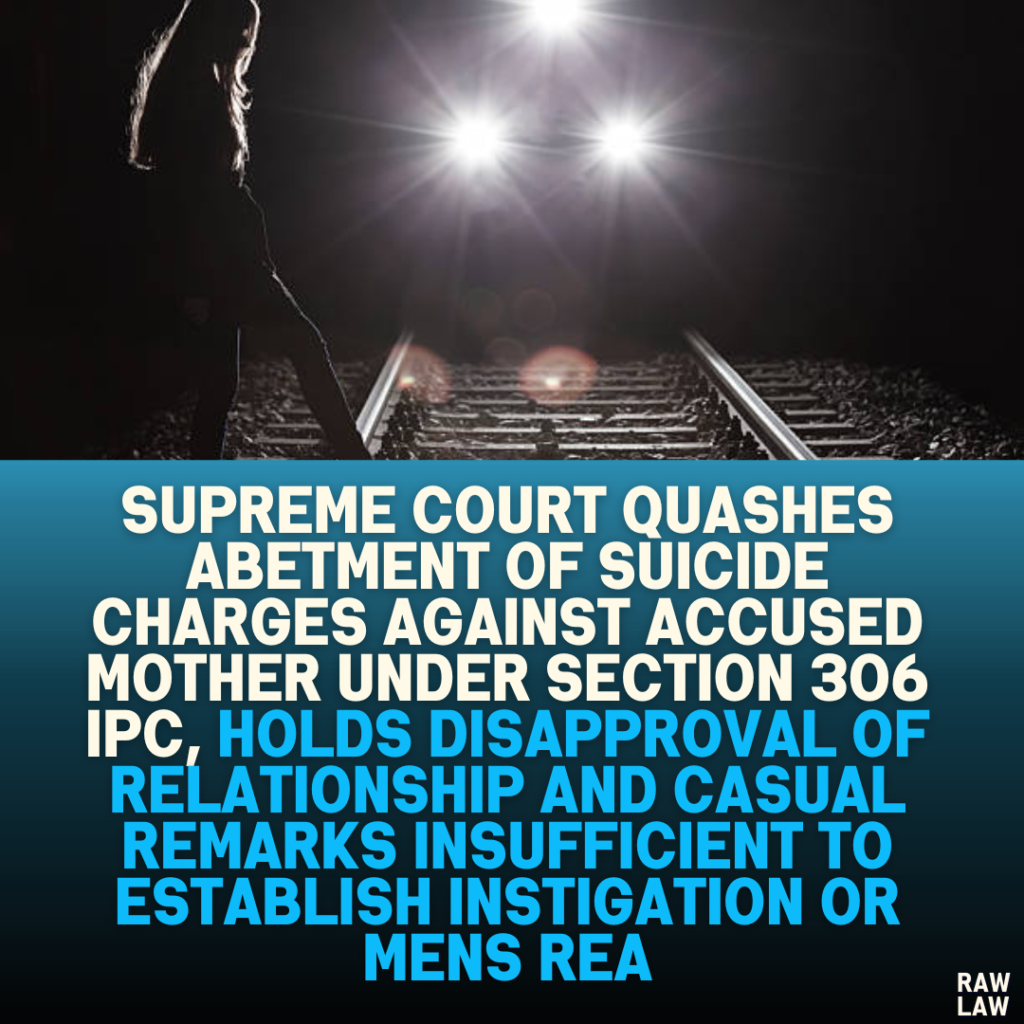1. Court’s Decision
The Supreme Court quashed the charges against the appellant, Laxmi Das, under Section 306 IPC. It observed that neither her actions nor her alleged remarks amounted to instigation or abetment of suicide. The court held:
“Even if all evidence on record, including the chargesheet and the witness statements, are taken to be correct, there is not an iota of evidence against the appellant.”
The court allowed the appeal, set aside the High Court’s decision upholding charges against the appellant, and quashed the proceedings as they pertained to her.
2. Facts
- Background of the Case: The appellant, Laxmi Das, is the mother of Babu Das, who was in a romantic relationship with the deceased, Souma Pal. The relationship faced opposition from the deceased’s family, who prioritized her education over the relationship.
- Incident: On July 3, 2008, the deceased was found dead near railway tracks between Garia and Narendrapur stations. The postmortem report indicated suicide due to injuries sustained from jumping in front of a train.
- Charges and Allegations:
- The deceased’s family alleged that the appellant and other accused encouraged the relationship and did not assist in finding the deceased when she went missing.
- A statement from a witness alleged that the appellant told the deceased: “If you cannot live without Babu, then you need not be alive.”
- A chargesheet was filed under Sections 306 (abetment of suicide) and 109 (abetment) read with 34 IPC, implicating all accused, including Laxmi Das.
3. Issues
The primary issue before the Supreme Court was:
- Whether the appellant’s alleged actions and remarks amounted to “instigation” or “abetment” under Section 306 IPC, thereby justifying the continuation of criminal proceedings against her.
4. Petitioner’s Arguments
The appellant, Laxmi Das, argued that:
- No Proximate Connection: Her alleged remarks and actions lacked any direct or proximate link to the deceased’s suicide.
- No Mens Rea: Even if her remarks were taken at face value, they did not demonstrate intent (mens rea) to incite or abet suicide.
- Family Dynamics: The deceased’s family’s disapproval of the relationship was the primary source of stress for the deceased, not any action or remark from the appellant.
- Insufficient Evidence: The charges were based on speculative allegations without substantive evidence.
5. Respondent’s Arguments
The State and the complainant contended that:
- Prima Facie Case: The appellant’s remarks and disapproval contributed to the deceased’s mental distress, forming a prima facie case under Section 306 IPC.
- High Court’s Ruling Valid: The High Court was correct in dismissing the appellant’s plea, as witness statements suggested instigation by the appellant.
6. Analysis of the Law
The court analyzed the legal requirements under Sections 306 and 107 IPC:
- Section 306 IPC (Abetment of Suicide): It penalizes abetment in cases of suicide, requiring the following elements:
- A direct or indirect act of instigation.
- Mens rea to abet the commission of suicide.
- Proximity between the instigation and the act of suicide.
- Section 107 IPC (Abetment): It defines abetment to include:
- Instigation of the victim to commit the act.
- Engaging in a conspiracy to commit the act.
- Intentional aiding of the act through a positive act or omission.
7. Precedent Analysis
The court referred to landmark rulings to interpret the scope of Sections 306 and 107 IPC:
- Rohini Sudarshan Gangurde v. State of Maharashtra (2024):
- Held that a marital dispute without direct acts of instigation or conspiracy does not amount to abetment.
- Prakash v. State of Maharashtra (2024):
- Reiterated that mere remarks or disapproval, without proximity to the act of suicide, do not constitute abetment.
- Ramesh Kumar v. State of Chhattisgarh (2001):
- Clarified that instigation must involve a deliberate action or remark that leaves the victim with no choice but to commit suicide.
- Pawan Kumar v. State of Himachal Pradesh (2017):
- Stated that casual remarks, reprimands, or actions without a deliberate intent to incite suicide do not qualify as abetment.
8. Court’s Reasoning
The Supreme Court highlighted the following points:
- Absence of Instigation: The appellant’s alleged remarks, even if made, did not amount to a deliberate provocation or encouragement to commit suicide.
- Lack of Mens Rea: There was no evidence suggesting that the appellant intended to drive the deceased to suicide.
- Indirect Role: The appellant’s actions were too remote and indirect to establish abetment under Section 306 IPC.
- Remarks in Context: The alleged remark—“you need not be alive”—was made in a moment of frustration and did not constitute instigation or create a compelling situation for the deceased to end her life.
9. Conclusion
The court quashed the proceedings against the appellant, Laxmi Das, holding that her actions did not meet the threshold for abetment under Section 306 IPC. It clarified that the trial court could proceed against other accused in accordance with the law.
10. Implications
This ruling has significant implications:
- Narrowing the Scope of Section 306 IPC: It reinforces that casual remarks or family disapproval do not constitute abetment unless accompanied by direct or proximate acts of instigation.
- Safeguarding Against Misuse: It prevents the misuse of Section 306 IPC by setting a high threshold for establishing culpability, ensuring that innocent individuals are not dragged into baseless criminal proceedings.
- Focus on Evidence: It underscores the importance of direct evidence and clear mens rea in cases involving abetment of suicide.



